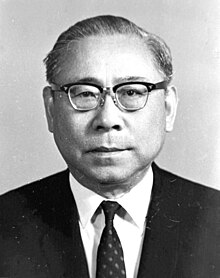- ↑ 王静仪、李力庸、郑政诚. 《臺灣省議會歷任議長副議長略傳》. 台湾省咨议会. 2016-04. ISBN 9789860485073.Wang Jingyi, Li Liyong, Zheng Zhengcheng. "Brief Biography of Previous Speakers and Deputy Speakers of the Taiwan Provincial Assembly". Taiwan Provincial Council. 2016-04. ISBN 9789860485073.
- 1 2 3 4 周宗贤. 《黃朝琴傳》. 台湾省文献委员会. 1994. ISBN 957-00-4183-8.(Zhou Zongxian. "The Biography of Huang Chao-chin". Taiwan Provincial Literature Committee. 1994. ISBN 957-00-4183-8.)
- 1 2 3 黄朝琴. 《我的回憶》. 黄陈印莲. 1981.(Huang Chao-chin. "My Memories". Huang Chen Yin-lien. 1981.)
- ↑ 逢甲大學 (2019-09-12). 文白之爭──語文;教育;國族的百年戰場 [The Battle between Wen and Bai——Chinese; Education; The Centennial Battlefield of the Nation] (in Russian). Translated by fengjia university. 五南圖書出版股份有限公司. ISBN 978-957-763-545-7.
- ↑ Huang, Huangxiong (2017). San dai Taiwan ren : bai nian zhui qiu de xian shi yu li xiang. Internet Archive. Xinbei Shi : Yuan zu wen hua. ISBN 978-986-95322-9-7.
- 1 2 吴浊流著,锺肇政译. 《台灣連翹》. 前卫出版社出版. 1991年5月15日台湾版第四刷.Written by Wu Zhuoliu and translated by Chung Chao-cheng. "Taiwan Forsythia". Published by Avant-garde Publishing House. The fourth Taiwan edition was published on May 15, 1991.
- ↑ 徐琼二. 黃朝琴論.Xu Qiong'er. Huang Chao-chin's Theory.
- ↑ 自由時報電子報 (2008-04-09). "日籍前校長之子捐款 鹽水國小軟網隊比賽有經費 – 生活 – 自由時報電子報". news.ltn.com.tw (in Chinese (Taiwan)). Retrieved 2024-05-15.
- ↑ "陳凱劭的BLOG » 蔡榮華(1907–1983)與黃朝琴". 2021-01-24. Archived from the original on 2021-01-24. Retrieved 2024-05-15.
- ↑ 立法院中南部服務中心 (2022-09-19). "朝琴紀念館(行政中心)". 立法院中南部服務中心. Retrieved 2024-05-15.
- ↑ 立法院中南部服務中心 (2023-03-31). "立法院民主議政園區-園區景點-黃朝琴先生像". Archived from the original on 2023-03-31. Retrieved 2024-05-15.
- ↑ 沈吕巡《从辜宽敏想到黄朝琴》,中国时报2017年1月15日。Shen Lu-hsun, "From Koo Kwang-ming to Huang Chao-chin," China Times, January 15, 2017.
- ↑ 林曙光,《打狗采风录》,高雄:春晖出版社,1993年。页208。(Lin Shuguang, "Dogging Dogs to Collect Styles", Kaohsiung: Chunhui Publishing House, 1993. Page 208.)
Huang Chao-chin | |
|---|---|
 | |
| Speaker of the Taiwan Provincial Assembly | |
| In office 1946–1963 |
| International | |
|---|---|
| National | |
| People | |